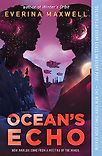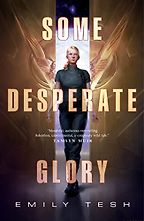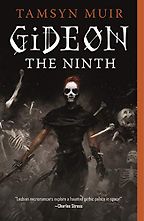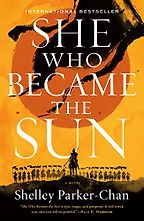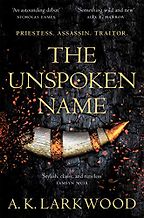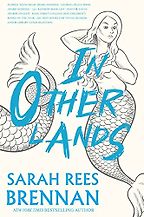How do you think about queer science fiction and fantasy?
There have been gay authors writing science fiction and fantasy almost since the genre started, but in recent years we’ve seen this massive flowering of queer representation in mainstream science fiction and fantasy.
We didn’t invent it in the last few years, but it has certainly been mainstreamed. For people like me, that’s amazing because science fiction and fantasy are my home genres. This is what I grew up writing, so to see myself and my friends represented is just incredible. I feel really lucky to be alive and reading right now.
The first queer science fiction novel that you’ve chosen to recommend is Emily Tesh’s Some Desperate Glory. Can you please introduce us to this work?
Ironically, this may be the one where queerness is most central to it, and yet, of all of these books, it’s the furthest away from romance. It’s a good place to start.
Some Desperate Glory is a science fiction book that has been compared to Ender’s Game. It is about what happens after the world wasn’t saved. This book starts with the main character, who’s a young soldier, desperately trying to stop the weapon that is coming to destroy Earth, and she fails. This is chapter one.
Then, you find out she’s running a simulation. She is a child soldier on this space station with the remnants of humanity who have escaped Earth–and they think they’re the heroes, but you, the reader, immediately understand they’re not. These are the human holdouts who refuse to live with the aliens who destroyed their world, and their charismatic leader who uses this idea of revenge to keep them under control.
“In recent years we’ve seen a flowering of queer representation in mainstream science fiction and fantasy”
Kyr, the main character, is a child soldier who has become enormously radicalized, and you can see she’s radicalized, and you are shrieking at her the entire time. She goes through the process of going into the wider universe and having her mind levered open, and you can see the whole deradicalization process. She’s awful. I love her.
She’s not queer in a way that we would necessarily recognize as queer representation, she is shoved so deeply into the closet that she doesn’t even know there’s a closet. Her brain has been so much shaped by this pressure cooker around her that seeing these seeds of difference in herself is an enormously fulfilling journey.
I’m going into the queer themes and the concept, but this runs as fast as a thriller. It’s an action book through and through. It’s a very strong, very dark, very character-centric novel. I blurbed this book; it was one of my favorite books of the year, it’s incredible.
It sounds like this book is doing interesting things with how you, as a reader, identify with the protagonist.
You do not like Kyr in chapter one. I started liking her about a third of the way through the book, when she gets shoved from a world that hates her to a world that doesn’t understand her. She is getting battered from all sides, and you’re thinking, ‘Oh sweetie, I can see the way forward for you, but you can’t see it because your growth has been so stunted.’
You can see exactly why she’s like this, and you’re cheering her, on every step of the way, to becoming someone else. Eventually, she does, and that’s amazing.
That sounds wonderful. Your next recommendation for an outstanding queer science fiction novel is Gideon the Ninth, by Tamsyn Muir. Can you introduce us to this book?
Gideon the Ninth has been officially described as ‘lesbian necromancers in space,’ although many people have pointed out that many of the characters are not lesbians, the main character is not a necromancer, and—actually—they spend most of their time on a planet. Still, I love this tagline as a starting point because it tells you to abandon all preconceptions and go along with the ride. My God, what a ride this is.
The main character is a glorified bodyguard in a Gormenghast-like religion. She’s a horrible teenage lesbian girl who’s mainly in love with working out and pin-up girls in magazines, and who wants to run off and join the army. That’s a pretty uncommon archetype for lesbians in mainstream science fiction; I’m not saying it hasn’t been done—of course there have been butch lesbians in science fiction—but I love this horrible teen.
She is in love with a horrible nerd girl, who also happens to be the high priestess and heir to their house. They are pulled away from their home for a deadly competition in which the necromancers are all trying to ascend to a higher realm.
It’s almost a horror book. I would say it’s mainly sci-fi, crossed a bit with horror. The sequel to this book made me scared to turn the light off, but that’s because I’m a complete baby about horror. I never read horror, but I read this book because I love it.
Get the weekly Five Books newsletter
A lot of the book is about the aesthetic of raising skeletons, of the horrible things we can do with each other’s bodies, and death and life. That chimes very heavily with queer theory and with queer themes, because a lot of it is about what you do with your body beyond religious dictates about what is right and what is wrong, and ethical dictates about ‘I can do this thing, is this right or is this not right?’
I think there are a couple of reasons I love it. First, it’s really funny. The concept as I’ve just given it does not sound funny, but it’s hilarious. Secondly, this is a book that is full of messy queer people. This one is also not a traditional romance, though I’d say it’s slightly more romantic than Some Desperate Glory.
It has a whole cast of various shades of people who have really messy queer desires, which don’t always work out. They do horrible things to each other, they betray each other, they have obsessions that they shouldn’t, and none of that is about ‘oh, I feel bad about being gay.’ We have gone into ten dimensions of terrible ways to be gay. I love that you can be gay, and you can be just really awful about it. I love this book. It’s great.
As an author writing queer characters with ethical dilemmas, how do you avoid making it seem like queerness is an ethical dilemma itself?
It’s a really interesting question. The place we are lucky to be in right now is that we have so many queer science fiction narratives that one of them does not have to bear the burden of being everything for everyone.
That’s really important because in earlier years, we had some discussions about whether people were getting tired of coming-out narratives and whether it is better to write queernorm (which means depicting a society in which being queer is un-remarked upon and people have other problems).
I think we’ve finally gotten to a place where we realize it’s not that either one of them is better. It’s not that gay people can’t have happy relationships, ethical relationships, unethical relationships, or horribly messy and toxic relationships. It is good that all of those are represented. It’s fantastic for science fiction fans that all of those are represented in science fiction.
I tend to write queernorm worlds, and I tend to write relationships that are messy but ultimately ethical and happy. In some of these books, that is not the case, and it’s fantastic for me that we have these options.
That’s wonderful to hear. Moving on, your next recommendation for us is the queer fantasy novel She Who Became the Sun, by Shelley Parker-Chan. Can you introduce us to this book?
This is a good one. She Who Became the Sun is a historical fantasy with light speculative elements. It is set in a country which draws heavily on Chinese history. It’s about Zhu Chongba, a starving orphan who dies at quite an early age. As a young girl, her brother is prophesied to become emperor, but he dies–so Zhu assumes his identity and fights her way into power. It is based on a historical emperor, I understand, but with a speculative twist.
The novel does really interesting things with gender, because the person now calling themselves Zhu doesn’t strictly identify as a girl. She occupies this space between genders, which I find fascinating. Zhu has a relationship with a woman, who eventually becomes her wife. I would call that a lesbian relationship, despite the fact that Zhu has this very interesting stuff going on regarding her gender.
Even if it didn’t contain all this interesting stuff about gender and queerness, I would still say this is a fantastic adventure story. I would read it three times. It’s told from multiple points of view, and is one of those novels where every time you switch, you think: ‘Yes! It’s this person again.’
Wonderful. Your next recommendation for us is The Unspoken Name by A.K. Larkwood. Please tell us more about this queer fantasy novel.
This was the book that made me fall back in love with high fantasy. I used to love high fantasy and then I stopped reading it for years and years—maybe I overdosed as a teenager.
The Unspoken Name is about a girl called Csorwe, who is slated to be sacrificed to the cult she was raised in. Instead, she decides to run away with this wizard who has turned up and offered to adopt her, by which he means he is going to be her employer. She works for him as an assassin.
This book is about Csorwe trying to prove herself to this wizard. She’s got an adopted brother who is awful. She falls in love with an academic wizard, this nerd girl who is similarly marked for death. The best way I can describe it is, if people have come across Ursula Le Guin‘s The Tombs of Atuan, but queer, and mainly about what happens after she gets out of that tomb.
Larkwood is incredibly good at the sense of the numinous and terrifying divine powers. Also, it’s very funny. I like books with jokes. I don’t care how many skeletons or even gods there are, I like some jokes.
On top of being incredibly funny, this book is immersive, creepy, and well-written. You could take out the queer relationship and you would still have a fantastic book, but with the queer relationship it is just so much richer and has so much more heart.
I’m personally very interested in the numinous—how do you see theology intersecting with science fiction?
I really love it when authors are able to invoke the sense of the numinous, because I think that is very difficult. Tolkien was extremely good at it, and he was a great deal better at it than some of his successors, who wrote Dungeons & Dragons-style pantheons, where the gods are understandable and do things that are mechanically predictable.
This is not to say that everyone writing in the vein of Tolkien can’t do numinosity, but Tolkien was great at the concept that we cannot understand everything that is happening with these divine powers, neither should we be able to, but what they do will affect what happens to our characters.
There is an amazing scene in this book where Csorwe goes up to be sacrificed. There is this procession, and she’s having complicated feelings about dying at fourteen, and, as a reader, you’re very immersed in this cult and this life. She goes to the mountain, and you get this incredibly quiet sequence of her going into the mountain, the emptiness of the cave she goes into, the very simple way that she summons the god, and how the god comes up. That, I think, is the mark of a consummate fantasy writer. You can make me feel that there is something here that I will never understand but has moved me deeply.
As a writer, do you think there’s a special trick to putting something in a novel that the reader doesn’t understand in a way that makes it engaging rather than frustrating?
I think so. I’ve dealt with this in the book I have coming out, where the main character encounters alien presences. I think we need some reaction on the character’s part to what they understand this to be, even if they don’t understand it at all. Even if, like in Lovecraft’s style, their reaction is horrible fear, we need them to signpost how it feels to interact with the numinous, with the divine, rather than explaining exactly what the numinous or the divine can do. I honestly aspire to be as good as Larkwood in this.
Your last recommendation for us is In Other Lands by Sarah Rees Brennan. Please tell us more about this queer fantasy romance.
I had to put this one in because I love queer romances, I love happy endings, and I love jokes. Rees Brennan is excellent at all of them. This is about a young man from our world who falls into a parallel world and ends up at a place called Border Camp, which is both treated very seriously and is also a parody of the ‘magical school’ genre.
The main character, Elliot, ends up in this other world where he is in classes where people can do magic, and there are elves. Some of the conflicts in this world are treated quite seriously, but at the same time, it is a loving send-up of many fantasy tropes. For example, the elves are very matriarchal, and they are a complete flip or parody of patriarchal attitudes. All the humans are mildly sexist in the way that humans tend to be, and then there is this elf, who is his classmate, who says ‘I think all the boys should be at home cooking and knitting.’ This is played for laughs, and Rees Brennan gets away with it because it is so funny.
At the same time, it is a very sweet and sincere coming-of-age story for this main character, who is realizing what it means to fall in love, what it means to not be a loner and to exist in the world in a network of relationships with people, and what it means that he has problems with his family back home and going over to this other world does not solve them. He is going back and forth between these worlds, so he has a fantasy arena for some of these problems, but it is never not grounded in what is a very real and believable situation for this guy.
I notice many of your recommendations feature nerds. Can you speak about the place of the nerd in queer science fiction?
There is a reason that the ‘nerd and jock’ romantic trope is a classic. On the one hand, I think there is a desire to explore the physical aspect of queer relationships. We have all had very different experiences of coming out of the closet. Many of us have very different relationships with our bodies and the way those bodies exist in the world. The refreshing thing in reading about a queer jock, for people who have more complicated relationships with their bodies, is that here is a queer person who is absolutely at home in their body, they are doing things with it that are bringing them joy, taking part in fighting or playing games, the epitome of physical activity in whatever world it is. I think there’s something very compelling there. Then, on the other hand, you have that relationship with someone who is more comfortable using their mind to do things. That’s the epitome of the jock and nerd relationship.
I would say the overwhelming majority of us who read and write science fiction might say we are nerds. You overthink stuff and you are very good at one particular area, but there is a limit to the stuff that your mind is good at. Often, this limit is the relationship you have with someone else you care very deeply about. It is that boundary where your mind meets someone else’s existence. I think that’s one reason that we are so interested in exploring nerds in fantasy.
Speaking of funny, romantic science fiction novels, could you tell us about your own book, Ocean’s Echo?
Well, it’s queer, it’s romantic, and it’s funny, which are three things you might have noticed I like. Ocean’s Echo is a romantic sci-fi novel about two people with very different views of the world who mind-meld and find they each have something the other one lacks. It starts when the awful nephew of the president gets arrested for misusing his mind-reading powers. He ends up forcibly conscripted into the army and told to mind-meld.
The person he’s told to merge minds with happens to have absolutely cast-iron ethics and refuses to do it, so they decide to fake it. The rest of the book is about how they stop a military coup and fall in love. I’m really fascinated with the intersection where a person’s mind meets someone else’s, and also where their body meets someone else’s, and a lot of this is exploring that in a very literal way.
Fascinating. How does mind-melding function in this novel?
In this world, there are people who can read minds, and there are people who can write minds or compel people to do what they want to do. It is quite easy for these two to form what’s called a ‘sync’, where your minds are merged. In the book, it’s encouraged to use this to control the mindreader who’s being arrested. But that is not how it works out.
The novel explores the questions: if you are uncomfortable in your own mind and you could be in someone else’s, would you do that, and would that be a good thing? And, can you ever really understand someone else, and what happens to all that when the fact that you really love someone is in the mix?
This seems quite apt for an author—maybe readers and writers are metaphorically mind-melding through the page.
That’s a good point! This is what we’re doing all the time. We are occupying other people’s minds, and we are trying to live their lives, and we are trying to make our own lives richer as a result. I would say for your average reader it’s working pretty well. In the real world, I wouldn’t necessarily recommend mind-melding, but for me and books it’s been wonderful.
Five Books aims to keep its book recommendations and interviews up to date. If you are the interviewee and would like to update your choice of books (or even just what you say about them) please email us at [email protected]
Five Books interviews are expensive to produce. If you've enjoyed this interview, please support us by donating a small amount.

